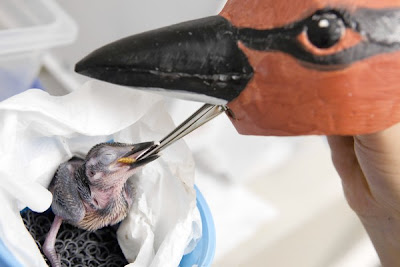Baby Guam Micronesian kingfishers increase world population to 134
A very rare Guam Micronesian kingfisher chick is fed using a hand puppet at Lincoln Park Zoo. All 134 members of the severely endangered species live in zoos. (Zbigniew Bzdak, Chicago Tribune / June 17, 2010)
Two baby Guam Micronesian kingfishers were recently born at Chicago's own Lincoln Park Zoo. Molly and I have been lucky enough to see these charming little birds in person in their bird house. Unfortunately, a zoo is the only place you'll see these rare birds, as they are sadly extinct in the wild. The story of how most of Guam's endemic birds became extinct or extinct in the wild is a strange one that starts with WWII.
Molly and I were invited some time ago to write an article for the awesome art blog Bad at Sports, which explains the very strange circumstances surrounding the kingfisher's current endangerment. You can read the full article here.
The eventual goal of this captive breeding population, (what we think should be the goal of all captive breeding programs) is to release the kingfishers back into the wild...though that may be far in the future.
Let's hope that one day these little guys again grace the waterways of beautiful Guam. Supporting their recovery is the least we can do at this point...so keep checking back with ESPP, as there's a Guam Micronesian kingfisher print in the works.
Two baby Guam Micronesian kingfishers were recently born at Chicago's own Lincoln Park Zoo. Molly and I have been lucky enough to see these charming little birds in person in their bird house. Unfortunately, a zoo is the only place you'll see these rare birds, as they are sadly extinct in the wild. The story of how most of Guam's endemic birds became extinct or extinct in the wild is a strange one that starts with WWII.
Molly and I were invited some time ago to write an article for the awesome art blog Bad at Sports, which explains the very strange circumstances surrounding the kingfisher's current endangerment. You can read the full article here.
The eventual goal of this captive breeding population, (what we think should be the goal of all captive breeding programs) is to release the kingfishers back into the wild...though that may be far in the future.
Let's hope that one day these little guys again grace the waterways of beautiful Guam. Supporting their recovery is the least we can do at this point...so keep checking back with ESPP, as there's a Guam Micronesian kingfisher print in the works.



It's interesting how an introduced species can cause a species that has previously existed somewhere, such as the Guam kingfisher, extinct (except in zoos).
ReplyDeleteThat's the way it is with evolution, though. Conditions change and those organisms that don't adapt to those conditions (e.g. different predators) don't survive.
Hi Annie,
ReplyDeleteYes, 'survival of the fittest' does say that species become extinct if they cannot compete in an environment. But the difference in the rubric lately is that human beings have wildly accelerated the pace of this type of selection, beyond any "natural" precedent.
We are currently in the midst of the 6th planetary extinction, the Holocene, but the pace of these extinctions is far far faster than any of the past extinctions...and of course, this is the only one to date being caused by one single species.
This is why I have to take issue with the 'extinction is natural' stance (though I'm not sure that this is what you intended to propose). Yes, human beings are part of nature, but there is no precedent for how we are currently affecting the "natural" part of "natural selection." :)